 文件IO
文件IO
# 文件 I/O
- 我们的IO是站在内存的角度去看待的, 输入( I )就是从文件里面把数据读取到内存,输出( O )就是从内存里面把数据写入到文件
# 1、标准C库 IO函数
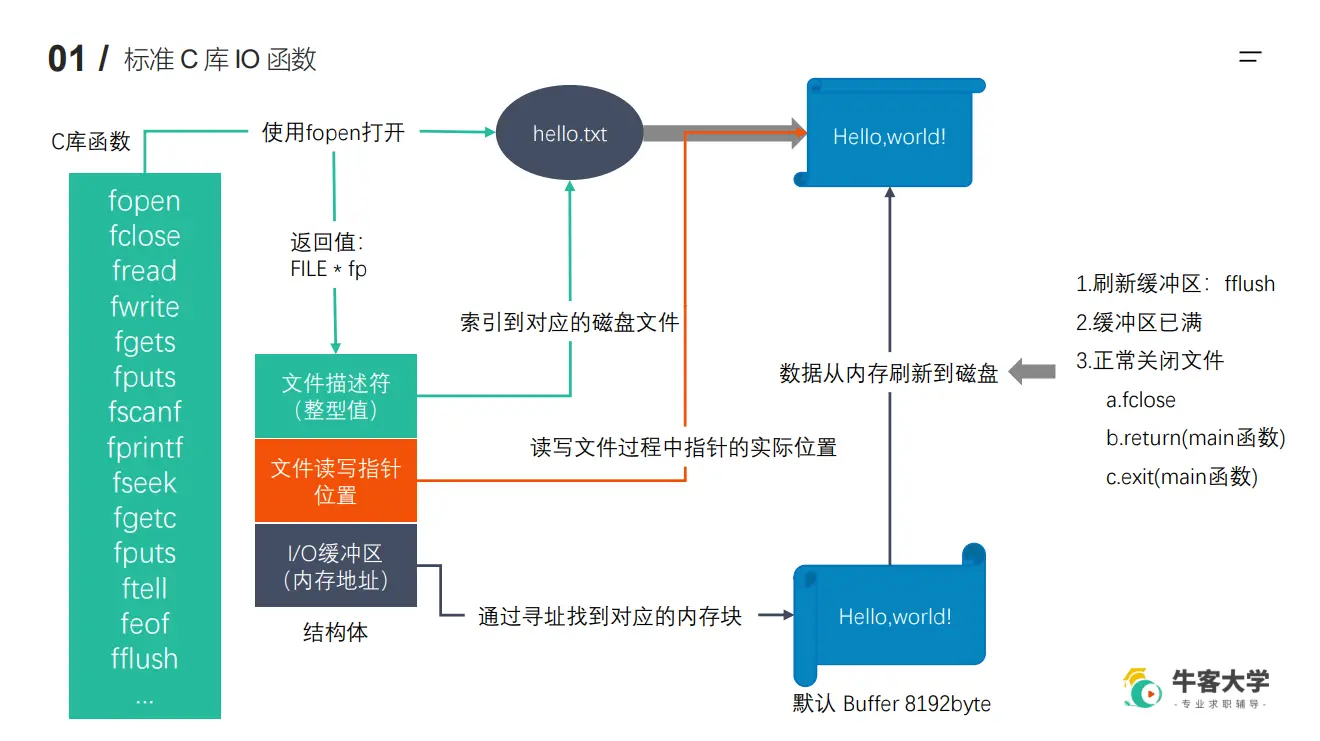
标准c库的 IO 函数有跨平台性,即我们用标准c库开发的程序再个个平台(操作系统)都可以运行
标准c库AKA第三方库,它是不属于操作系统的,它之所以能实现跨平台是因为他在不同平台会调用不同平台的系统 api
缓冲区大小默认是 8k (可调节,但不建议)
# 2、标准c库IO和Linux系统IO的关系
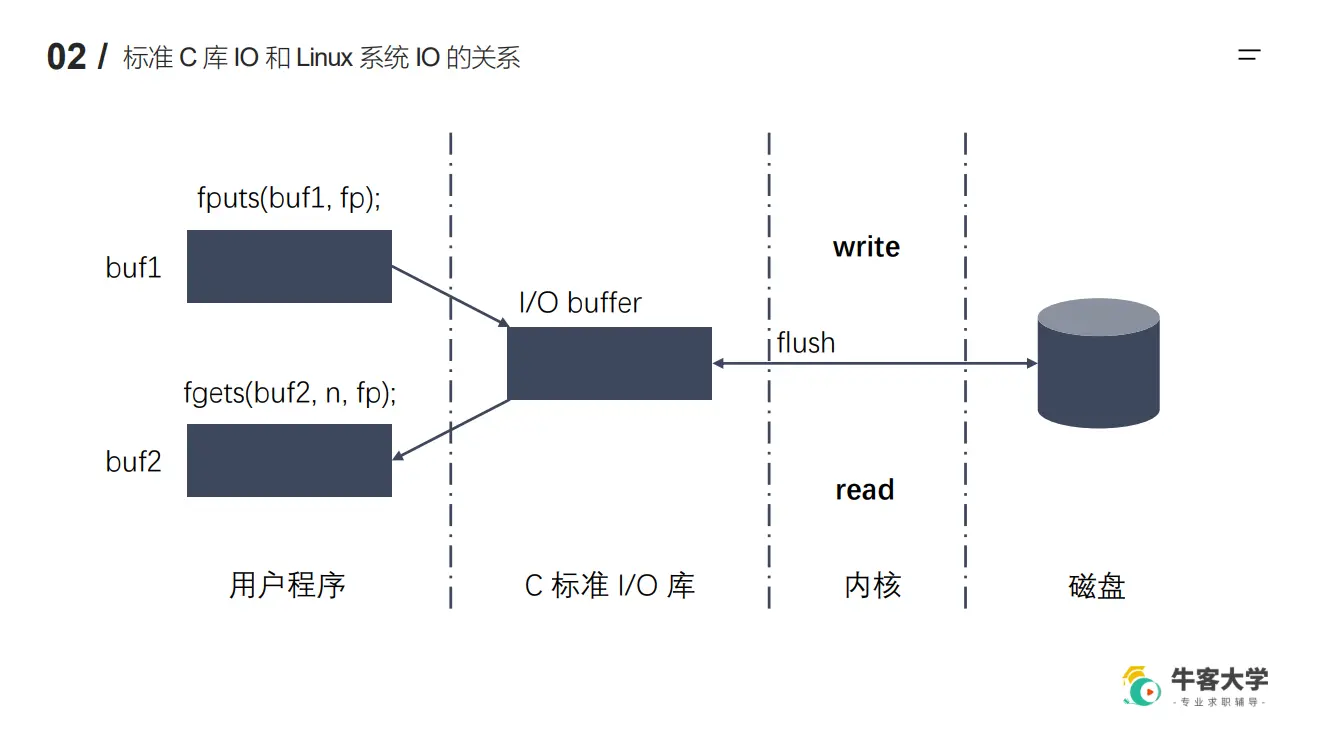
# 3、虚拟地址空间
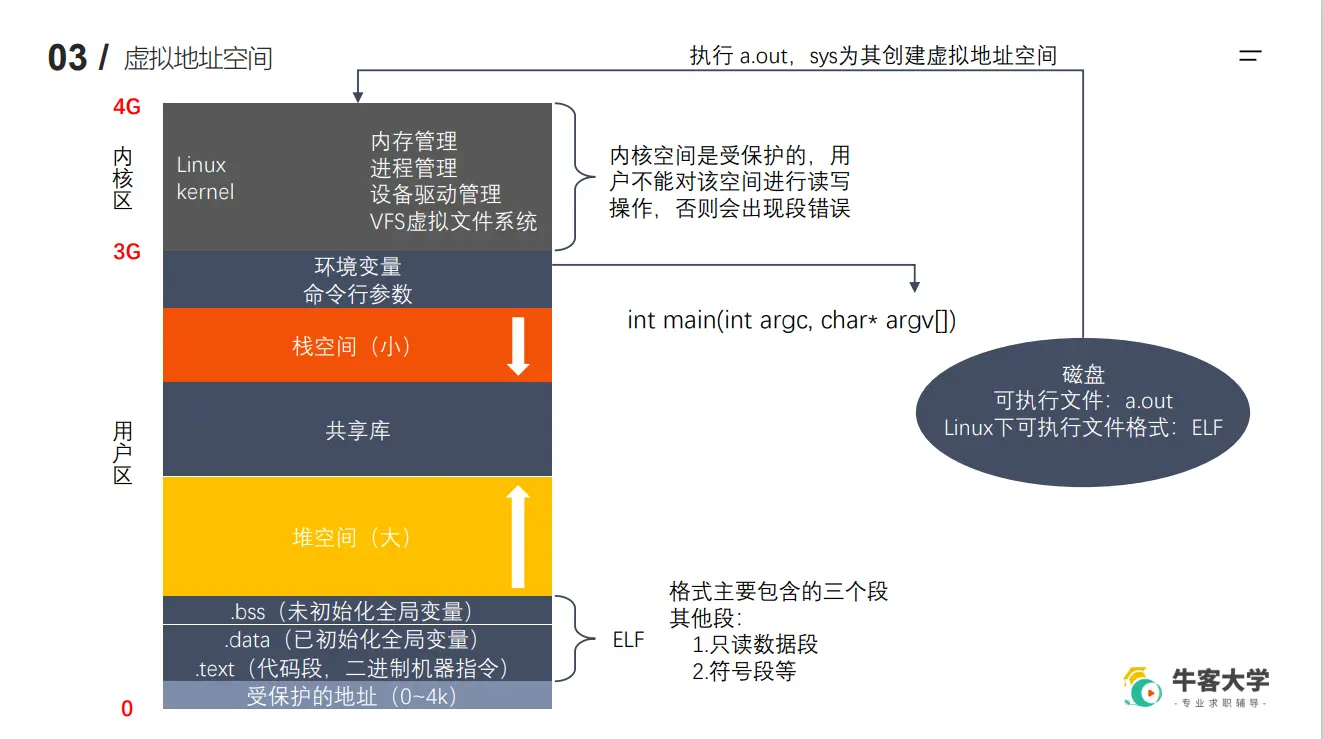
- 可执行程序运行期间就会对应一个虚拟内存空间,程序运行结束空间就不存在了
- 进程是系统给程序分配资源的最小单位
- 32位的计算机虚拟地址空间大小就是2^32(4G),我们上图就S是32位的
- 64位电脑并不是 2^64 位,而是 2^48
- linux kernel(Linux 内核区) 普通用户没有权限操作,要想操作内核区必须调用系统的API,通过系统 API函数(如 read ,write)来进行操作
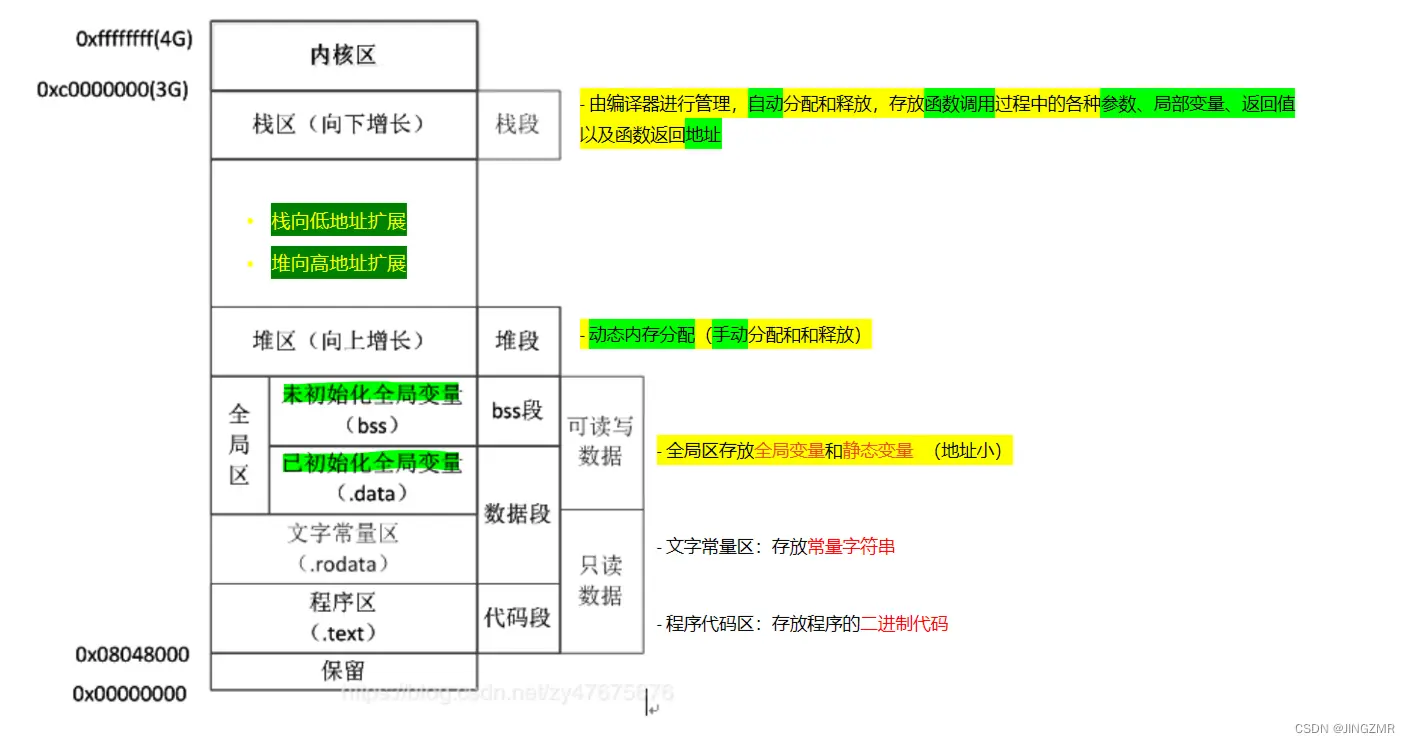
- 全局变量:保存在内存的全局存储区中,占用静态的存储单元
- 局部变量:保存在栈中,只有在所在函数被调用时才动态地为变量分配存储单元
# 4、文件描述符
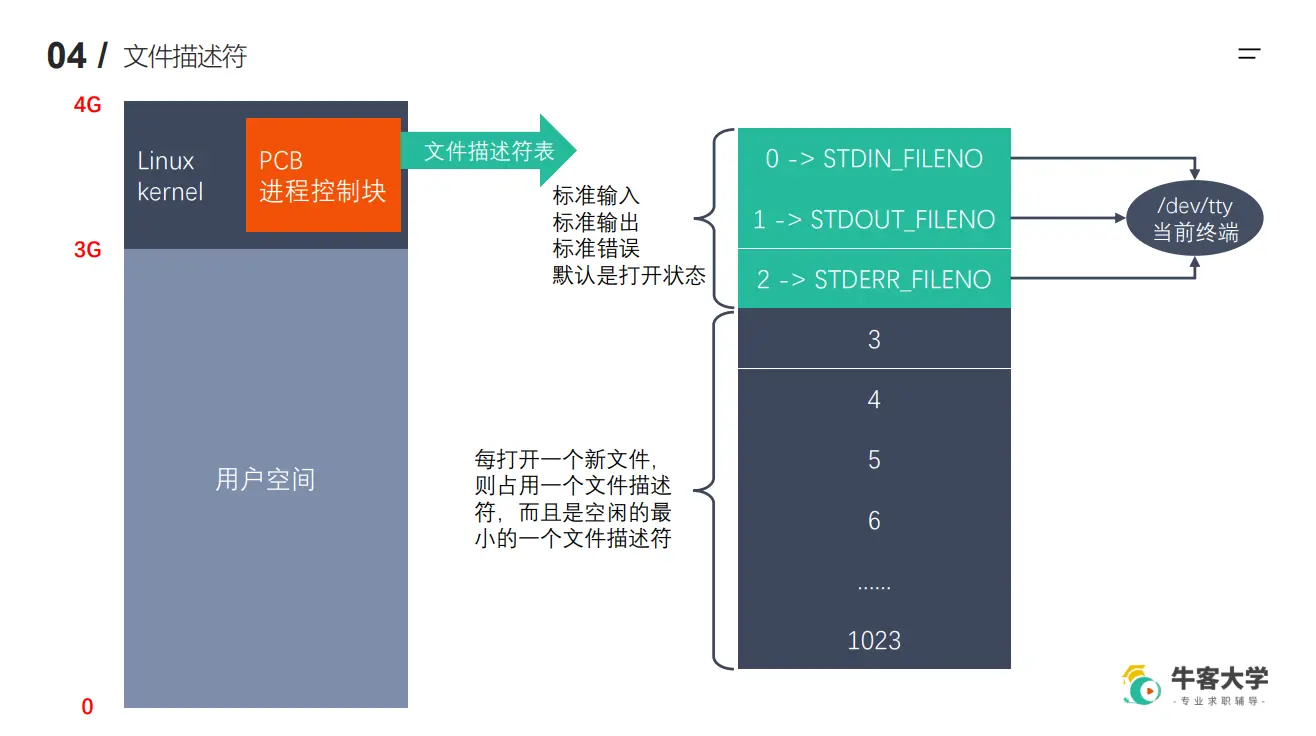
- 文件描述符是保存在内核区,由内核进行管理
- 内核有内存管理的功能,在内核的内存管理模块里有PCB进程控制块,由它来管理文件描述符
- PCB 是一个非常复杂的结构体,在这个结构体里有一个数组(文件描述符表),之所以需要这个表是因为我们可能会同时打开多个文件,那就会有多个文件描述符
- 文件描述符表的大小默认是 1024
- 文件描述符表的前三个默认是被占用的(如上图),标准输入(0),标准输出(1),标准错误(2),他们指向的是当前的终端
- 注意: “每打开...描述符” 这段话的意思是,好比我们有3个文件描述符,那就是从3开始占用文件描述符表的空间( 即3,4,5 ),当3号空间的文件描述符被释放,那重新产生的文件描述符就是进到3里,而不是存放到6里
# 5、Linux 系统 IO 函数
# 5.1 open打开文件
- int open(const char *pathname, int flags);
- 使用
man 2 open查看 open函数
/*
#include <sys/types.h>
#include <sys/stat.h>
#include <fcntl.h>
//打开一个已经存在的文件
int open(const char *pathname, int flags);
参数:
- pathname : 要打开的文件路径
- flags: 对文件的操作权限设置还有其他的设置
O_RDONLY(可读), O_WRONLY(可写), O_RDWR(可读可写) 这3个是互斥的
返回值:返回一个新的文件描述符,如果调用失败,返回 -1
errno:属于Linux系统函数库,库里面的一个全局变量,记录的是最近的错误号。
#include <stdio.h>
void perror(const char *s); 作用:打印error对应的错误描述
s参数:用户描述,比如hello,最终输出的内容是 hello:xxx(实际的错误描述)
*/
1
2
3
4
5
6
7
8
9
10
11
12
13
14
15
16
17
18
19
20
21
2
3
4
5
6
7
8
9
10
11
12
13
14
15
16
17
18
19
20
21
// open.c ,此时我们当前文件夹里没有a.txt文件
#include <sys/types.h>
#include <sys/stat.h>
#include <fcntl.h>
#include <stdio.h> //perror
#include <unistd.h> //close
int main()
{
//打开一个文件
int fd = open("a.txt", O_RDONLY);
if (fd == -1)
{
perror("open");
}
// 关闭fd(文件描述符)指向的文件
//close就是根据文件描述符关闭其指向的文件
close(fd);
return 0;
}
1
2
3
4
5
6
7
8
9
10
11
12
13
14
15
16
17
18
19
20
21
22
23
2
3
4
5
6
7
8
9
10
11
12
13
14
15
16
17
18
19
20
21
22
23
gcc open.c -o open生成 可执行文件 open- 执行可执行文件
./open
//此时我们当前文件夹里没有a.txt文件,那么它就显示没有这样的文件或目录
open: No such file or directory
1
2
2
# 5.2 open创建新文件
- int open(const char *pathname, int flags, mode_t mode);
#include <sys/types.h>
#include <sys/stat.h>
#include <fcntl.h>
int open(const char *pathname, int flags, mode_t mode);
参数:
- pathname:要创建的文件的路径
- flags: 对文件的操作权限设置还有其他的设置
-必选项: O_RDONLY(可读), O_WRONLY(可写), O_RDWR(可读可写) 这3个是互斥的
-可选项: O_CREAT 文件不存在,创建新文件
- mode:八进制的数,表示创建出来的新文件的操作权限 比如:0775
0777-> rwxrwxrwx , rw-rw-r-- => 0664
单独拿一组出来解释一下: rwx -》2^2 + 2^1 + 2^1 = 7
最终的权限是:mode & ~umask(权限掩码,普通用户的默认的umask是0002,root是0022)
比如: 我们给mode 为 0777 那么最终的权限就是:0775
~umask : 0002取反(八进制)那就是 111 111 101 -》0775
最终权限:
0777 ——> 111111111
& 0775 ——> 111111101
-----------------------------
111111101
按位与: 0和任何数都为0 ,umask的作用就算抹去某些权限
1
2
3
4
5
6
7
8
9
10
11
12
13
14
15
16
17
18
19
20
21
22
23
24
25
2
3
4
5
6
7
8
9
10
11
12
13
14
15
16
17
18
19
20
21
22
23
24
25
- flags 参数是一个int类型的数据,占4个字节,32位。
- flags 32个位,每一位就是一个标志位。
- 这也是为什么我们写falgs的参数时用 |[按位或] 的原因,就好比说32位里每一位都代表一个权限,且都为0,然后O_RDONLY是000。。。1,那我们就用 | 将flags的第一位置为1,这里只是打个比方,不是说O_RDONLY就第一位
// create.c
#include <sys/types.h>
#include <sys/stat.h>
#include <fcntl.h>
#include <unistd.h>
#include <stdio.h>
int main()
{ //下面行的权限必须写四位的数,如 0777而不能写 777(这样写的话是10进制数)
int fd = open("create.txt", O_RDWR | O_CREAT, 0777);
if (fd == -1)
{
perror("open");
}
// 关闭
close(fd);
return 0;
}
1
2
3
4
5
6
7
8
9
10
11
12
13
14
15
16
17
18
19
20
21
2
3
4
5
6
7
8
9
10
11
12
13
14
15
16
17
18
19
20
21
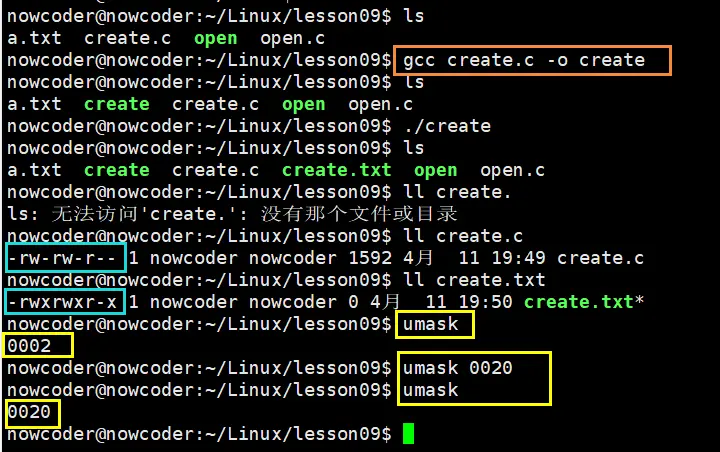
- 可以看出,
create.txt的权限为 0775 - 权限掩码 umask:
- 查看指令:
umask - 修改指令:
umask 想要改成的权限如umask 022,这种修改方式关闭终端就会被还原 - 也可以使用 umask()函数在程序中设置这个值
man 2 umask,查看umask()函数
- 查看指令:
# 5.3 read , write函数
- ssize_t read(int fd, void *buf, size_t count);
- ssize_t write(int fd, const void *buf, size_t count);
#include <unistd.h>
ssize_t read(int fd, void *buf, size_t count);
参数:
- fd:文件描述符,open得到的,通过这个文件描述符操作某个文件
- buf:需要读取数据存放的地方,数组的地址 (传出参数)
- count:指定的数组的大小
返回值:
- 成功:
>0 :返回实际的读取到得字节数
=0 : 文件已经读取完了
- 失败:-1,并且设置errno
#include <unistd.h>
ssize_t write(int fd, const void *buf, size_t count);
参数:
- fd:文件描述符,open得到的,通过这个文件描述符操作某个文件
- buf:要往磁盘写入的数据,数据
- count:要写入的数据的实际的大小
返回值:
成功:实际写入的字节数
失败:放回-1,并设置 errno
1
2
3
4
5
6
7
8
9
10
11
12
13
14
15
16
17
18
19
20
21
22
2
3
4
5
6
7
8
9
10
11
12
13
14
15
16
17
18
19
20
21
22
#include <unistd.h>
#include <stdio.h>
#include <sys/types.h>
#include <sys/stat.h>
#include <fcntl.h>
int main()
{
// 1.通过open打开english.txt文件
int srcfd = open("english.txt", O_RDONLY);
if (srcfd == -1)
{
perror("open");
return -1;
}
// 2.创建一个新的文件 (拷贝文件)
int destfd = open("cpy.txt", O_WRONLY | O_CREAT, 0664);
if (destfd == -1)
{
perror("open");
return -1;
}
// 3,频繁的读写操作
// buf的大小我们可以自己设置
char buf[1024] = {0};
// 我们这里设置了1024,那么每次读取应该就是1024,只有最后一次读取不一样可能会小于1024
int len = 0;
// 得到实际的读取到得字节数,大于0说明还没读完
while ((len = read(srcfd, buf, sizeof(buf))) > 0)
{
write(destfd, buf, len);
}
// 4.关闭文件
close(destfd);
close(srcfd);
}
1
2
3
4
5
6
7
8
9
10
11
12
13
14
15
16
17
18
19
20
21
22
23
24
25
26
27
28
29
30
31
32
33
34
35
36
37
38
39
40
41
2
3
4
5
6
7
8
9
10
11
12
13
14
15
16
17
18
19
20
21
22
23
24
25
26
27
28
29
30
31
32
33
34
35
36
37
38
39
40
41
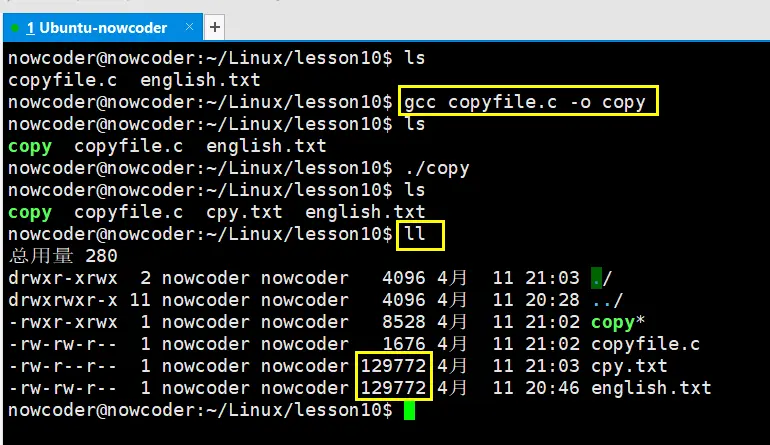
# 5.4、lseek函数
- off_t lseek(int fd, off_t offset, int whence);
//标志C库的函数
#include <stdio.h>
int fseek(FILE *stream, long offset, int whence);
//Linux系统函数
#include <sys/types.h>
#include <unistd.h>
off_t lseek(int fd, off_t offset, int whence);
- 参数:
- fd:文件描述符,通过 open 得到,通过这个 fd操作某个文件
- offset:偏移量
- whence:
SEEK_SET (文件开头)
设置文件指针的偏移量
SEEK_CUR
设置偏移量:当前位置 + 第二个参数 offset的值
SEEK_END (文件的末尾)
设置偏移量: 文件大小 + 第二个参数offset的值
- 返回值: 返回文件指针的位置
作用:
1.移动文件指针到文件头
lseek(fd, 0, SEEK_SET);
2.获取当前文件指针的位置
lseek(fd, 0, SEEK_CUR);
3.获取文件长度
lseek(fd, 0, SEEK_END);
4.拓展文件的长度,当前文件10b,110b,增加了 100个字节
lseek(fd, 100, SEEK_END);
注意:需要写一次数据
(拓展的作用:好比我们要下载东西,需要5G,我们可以先拓展出5G的大小,然后再继续下载,这样即使我们继续使用磁盘也不会有影响,因为我们5G的空间已经占用了)
1
2
3
4
5
6
7
8
9
10
11
12
13
14
15
16
17
18
19
20
21
22
23
24
25
26
27
28
29
30
2
3
4
5
6
7
8
9
10
11
12
13
14
15
16
17
18
19
20
21
22
23
24
25
26
27
28
29
30
//lseek.c
#include <sys/types.h>
#include <sys/stat.h>
#include <fcntl.h>
#include <unistd.h>
#include <stdio.h>
int main()
{
// 打开文件
int fd = open("hello.txt", O_RDWR);
if (fd == -1)
{
perror("open");
}
// 拓展文件的长度
int ret = lseek(fd, 100, SEEK_END);
if (ret == -1)
{
perror("lseek");
}
// 写入一个空数据
write(fd, " ", 1);
// 关闭文件
close(fd);
return 0;
}
1
2
3
4
5
6
7
8
9
10
11
12
13
14
15
16
17
18
19
20
21
22
23
24
25
26
27
28
29
30
31
2
3
4
5
6
7
8
9
10
11
12
13
14
15
16
17
18
19
20
21
22
23
24
25
26
27
28
29
30
31
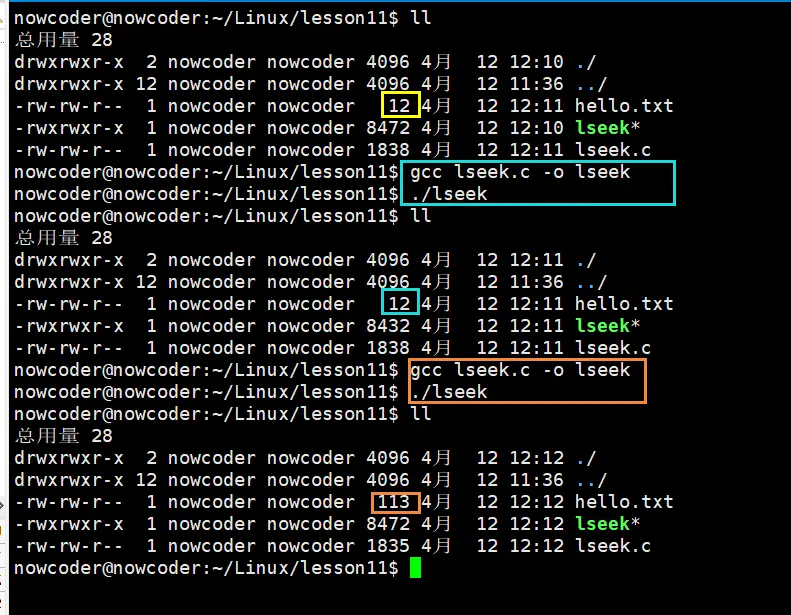
- 上图第一次编译生成并运行 lseek文件后,hello.txt 文件大小没变化,是因为我们没在拓展文件后写进东西
- 第二次成功是因为我们在拓展后,写入一个空数据
write(fd, " ", 1);,完整代码看上图 - 而在扩展出来的这段空间里,每一位都会被 null 填充
- 注意:lseek()不是扩展数据的功能,只是可以利用lseek()去扩展文件,lseek()只是单纯的移动文件指针偏移。
# 5.5 stat、lstat函数
- int stat(const char *pathname, struct stat *statbuf);
- int lstat(const char *pathname, struct stat *statbuf);
#include <sys/types.h>
#include <sys/stat.h>
#include <unistd.h>
int stat(const char *pathname, struct stat *statbuf);
作用:获取一个文件相关的信息
参数:
- pathname: 操作的文件的路径
- statbuf:结构体变量,传出参数,用于保存获取到的文件的信息
返回值:
成功:返回0
失败:返回-1 设置errno
1
2
3
4
5
6
7
8
9
10
11
2
3
4
5
6
7
8
9
10
11
//stat 结构体
struct stat {
dev_t st_dev; // 文件的设备编号
ino_t st_ino; // 节点
mode_t st_mode; // 文件的类型和存取的权限
nlink_t st_nlink; // 连到该文件的硬连接数目
uid_t st_uid; // 用户ID
gid_t st_gid; // 组ID
dev_t st_rdev; // 设备文件的设备编号
off_t st_size; // 文件字节数(文件大小)
blksize_t st_blksize; // 块大小
blkcnt_t st_blocks; // 块数
time_t st_atime; // 最后一次访问时间
time_t st_mtime; // 最后一次修改时间
time_t st_ctime; // 最后一次改变时间(指属性)
};
1
2
3
4
5
6
7
8
9
10
11
12
13
14
15
16
17
2
3
4
5
6
7
8
9
10
11
12
13
14
15
16
17
//a.txt
hello,world
//stat.c
#include <sys/types.h>
#include <sys/stat.h>
#include <unistd.h>
#include <stdio.h>
int main()
{
struct stat statbuf;
int ret = stat("a.txt", &statbuf);
if (ret == -1)
{
perror("stat");
return -1;
}
printf("size: %ld\n", statbuf.st_size);
return 0;
}
1
2
3
4
5
6
7
8
9
10
11
12
13
14
15
16
17
18
19
20
21
22
23
2
3
4
5
6
7
8
9
10
11
12
13
14
15
16
17
18
19
20
21
22
23
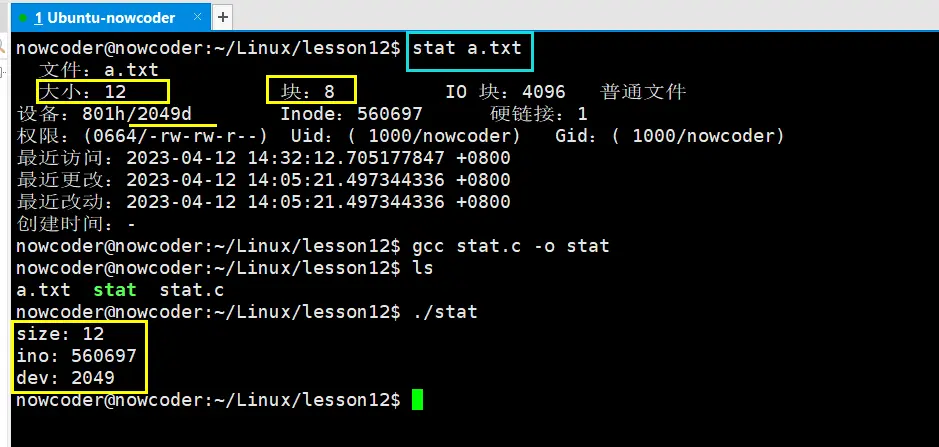
- 查看文件相关信息由两种方法
- 终端命令查看 如:
stat 文件路径 stat()函数
- 终端命令查看 如:
#include <sys/types.h>
#include <sys/stat.h>
#include <unistd.h>
int lstat(const char *pathname, struct stat *statbuf);
作用:获取一个文件相关的信息(获取软连接文件的信息)
参数:
- pathname: 操作的文件的路径
- statbuf:结构体变量,传出参数,用于保存获取到的文件的信息
返回值:
成功:返回0
失败:返回-1 设置errno
1
2
3
4
5
6
7
8
9
10
11
2
3
4
5
6
7
8
9
10
11
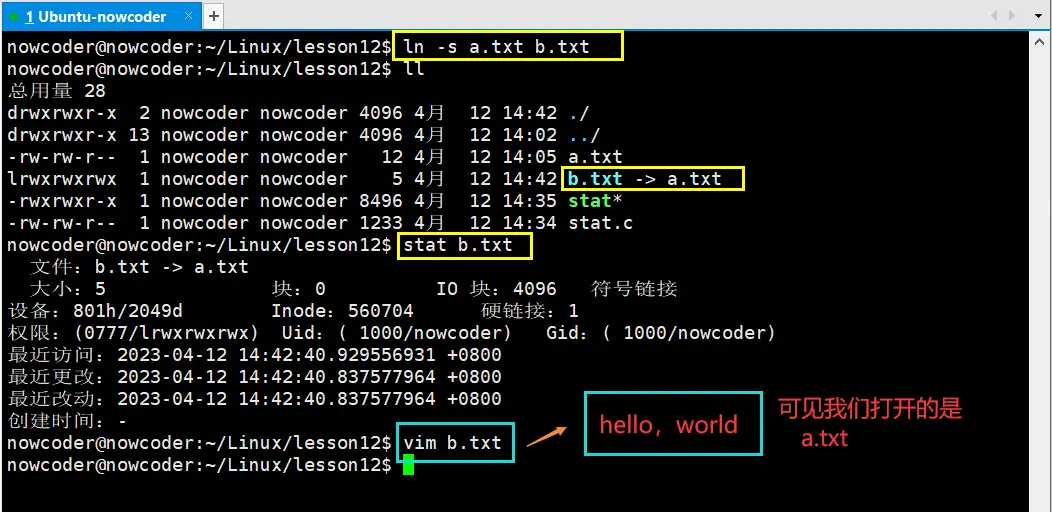
ln -s a.txt b.txt创建软链接文件b.txt指向a.txt- 如果我们用stat()函数查看,那我们查看的就是 a.txt 文件,所以要想查看软链接文件,必须使用 lstat()函数
#include <sys/types.h>
#include <sys/stat.h>
#include <unistd.h>
#include <stdio.h>
int main()
{
struct stat statbuf;
//这里查看的是b.txt(软链接),所以必须使用 lstat()函数
int ret = lstat("b.txt", &statbuf);
if (ret == -1)
{
perror("stat");
return -1;
}
printf("size: %ld\n", statbuf.st_size);
printf("ino: %ld\n", statbuf.st_ino);
printf("dev: %ld\n", statbuf.st_dev);
return 0;
}
1
2
3
4
5
6
7
8
9
10
11
12
13
14
15
16
17
18
19
20
21
22
23
24
2
3
4
5
6
7
8
9
10
11
12
13
14
15
16
17
18
19
20
21
22
23
24
# 6、stat结构体
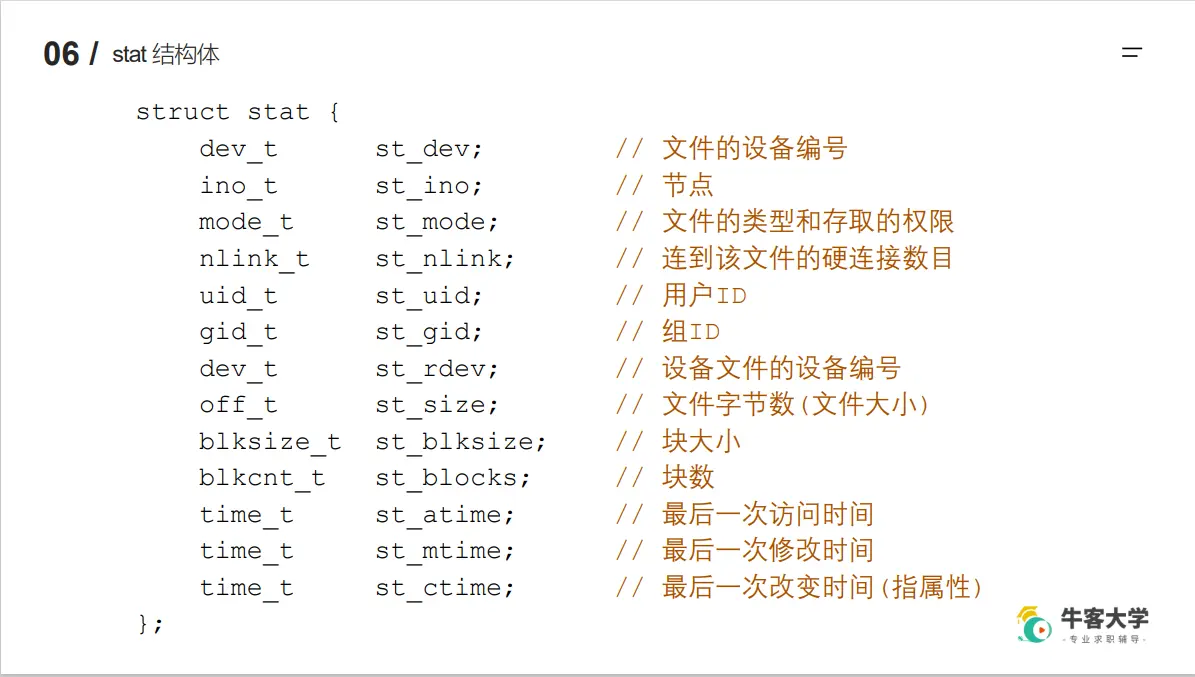
# 7、st_mode变量
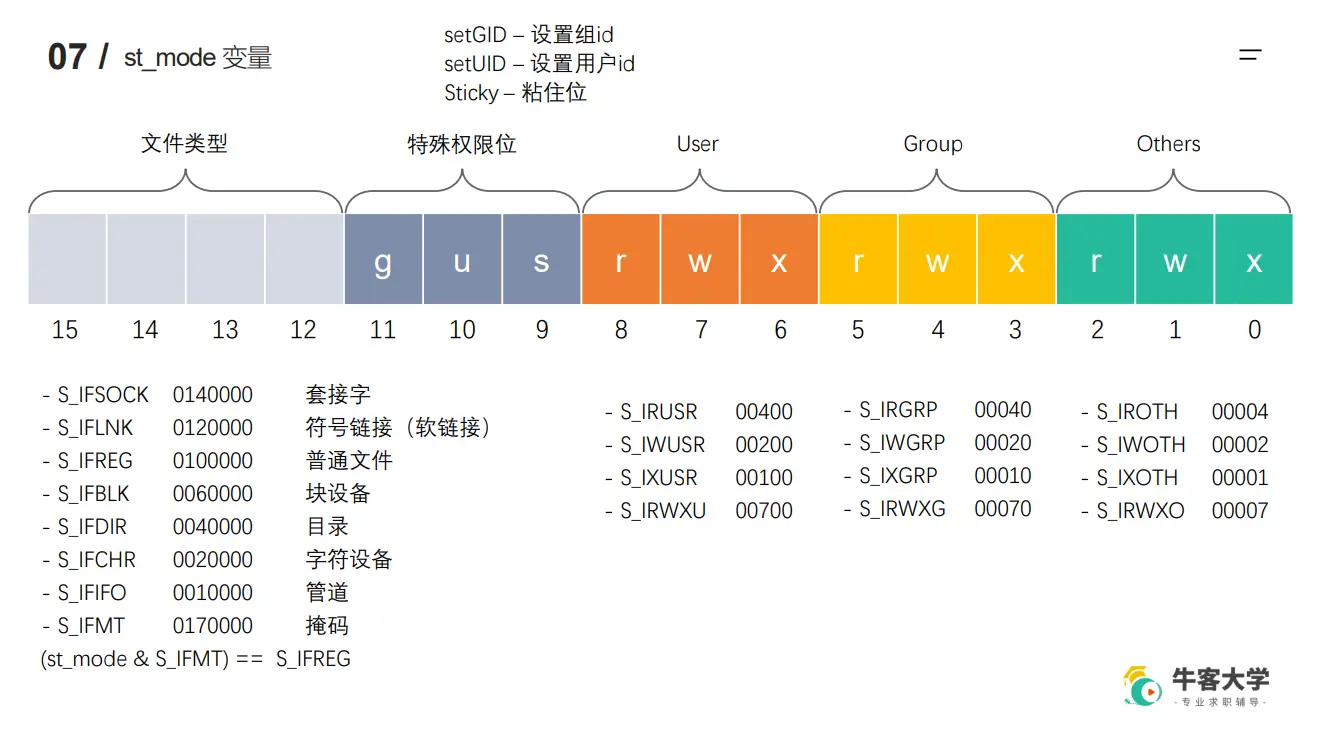
# 8、模拟实现 ls -l 命令
#include <stdio.h>
#include <sys/types.h>
#include <sys/stat.h>
#include <unistd.h>
#include <pwd.h>
#include <grp.h>
#include <time.h>
#include <string.h>
// 模拟实现 ls -l 指令
// -rw-rw-r-- 1 nowcoder nowcoder 12 4月 12 14:43 a.txt
int main(int argc, char *argv[])
{
// 因为我们的参数数组 argv 默认会有一个数据为我们可执行文件的文件名
// 所以 argc (参数数量)<2 ,说明没给参数,所以我们要判断输入的参数是否正确
if (argc < 2)
{
// 不正确,给出提示
printf("%s filename\n", argv[0]);
return -1;
}
// 通过stat函数获取用户传入的文件的信息
struct stat st;
int ret = stat(argv[1], &st);
if (ret == -1)
{
perror("stat");
return -1;
}
// 获取文件类型和文件权限
char perms[11] = {0}; // 用于保存文件类型和文件权限的字符串
// 获得的文件权限和权限掩码进行与运算,判断是什么类型的文件
//注意在我自己的vscode里写下面代码时, 像S_IFMT这些会显示说是未定义标识符,要写__S_IFMT才正常,这应该是版本问题,我们直接 S_IFMT这样写,在gcc里是可以正常编译运行的
switch (st.st_mode & S_IFMT)
{
case S_IFLNK:
perms[0] = 'l';
break;
case S_IFDIR:
perms[0] = 'd';
break;
case S_IFREG:
perms[0] = '-';
break;
case S_IFBLK:
perms[0] = 'b';
break;
case S_IFCHR:
perms[0] = 'c';
break;
case S_IFSOCK:
perms[0] = 's';
break;
case S_IFIFO:
perms[0] = 'p';
break;
default:
perms[0] = '?';
break;
}
// 判断文件的访问权限
// 文件所有者
// 按位与,遇0为0.同1为1
perms[1] = (st.st_mode & S_IRUSR) ? 'r' : '-';
perms[2] = (st.st_mode & S_IWUSR) ? 'w' : '-';
perms[3] = (st.st_mode & S_IXUSR) ? 'x' : '-';
// 文件所在组
perms[4] = (st.st_mode & S_IRGRP) ? 'r' : '-';
perms[5] = (st.st_mode & S_IWGRP) ? 'w' : '-';
perms[6] = (st.st_mode & S_IXGRP) ? 'x' : '-';
// 其他人
perms[7] = (st.st_mode & S_IROTH) ? 'r' : '-';
perms[8] = (st.st_mode & S_IWOTH) ? 'w' : '-';
perms[9] = (st.st_mode & S_IXOTH) ? 'x' : '-';
// 硬连接数
int linkNum = st.st_nlink;
// 文件所有者
// 因为 st.st_uid 获得的是一个id号,但我们模拟 ls -l 指令获得的是用户名
// 所以我们需要 pwd 库里的 getpwuid() 函数
char *fileUser = getpwuid(st.st_uid)->pw_name;
// 文件所在组
// 同上,我们需要 grp 库里的 getgrgid() 函数
char *fileGrp = getgrgid(st.st_gid)->gr_name;
// 文件大小
long int fileSize = st.st_size;
// 获取修改的时间
// st.st_mtime 获取到的是我们long int 型的数据,是从1970年到最后一次修改的秒数
// 所以我们要用 time 头文件里的 ctime函数来将时间转换成本地的时间
char *time = ctime(&st.st_mtime);
// 因为转换后,会在末尾加上一个 \n(换行符),所以我们创建一个数组
// 使用strncpy函数将 time数组的数据copy 到mtime数组里,复制的数据大小为 time数组大小减1,以此来去除末尾的换行符
char mtime[512] = {0};
strncpy(mtime, time, strlen(time) - 1);
// 也可以直接 time[strlen(time)-1]='\0';去到换行符
char buf[1024];
// sprintf 把格式化的数据写入某个字符串中,这里就是把格式化的数据写进 buf 里
// 注意这里的数据类型
sprintf(buf, "%s %d %s %s %ld %s %s", perms, linkNum, fileUser, fileGrp, fileSize, mtime, argv[1]);
// 输出字符串 buf
printf("%s\n", buf);
return 0;
}
1
2
3
4
5
6
7
8
9
10
11
12
13
14
15
16
17
18
19
20
21
22
23
24
25
26
27
28
29
30
31
32
33
34
35
36
37
38
39
40
41
42
43
44
45
46
47
48
49
50
51
52
53
54
55
56
57
58
59
60
61
62
63
64
65
66
67
68
69
70
71
72
73
74
75
76
77
78
79
80
81
82
83
84
85
86
87
88
89
90
91
92
93
94
95
96
97
98
99
100
101
102
103
104
105
106
107
108
109
110
111
112
113
114
115
116
117
118
119
120
2
3
4
5
6
7
8
9
10
11
12
13
14
15
16
17
18
19
20
21
22
23
24
25
26
27
28
29
30
31
32
33
34
35
36
37
38
39
40
41
42
43
44
45
46
47
48
49
50
51
52
53
54
55
56
57
58
59
60
61
62
63
64
65
66
67
68
69
70
71
72
73
74
75
76
77
78
79
80
81
82
83
84
85
86
87
88
89
90
91
92
93
94
95
96
97
98
99
100
101
102
103
104
105
106
107
108
109
110
111
112
113
114
115
116
117
118
119
120
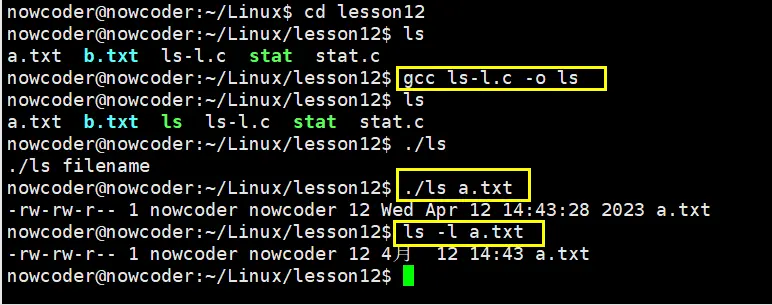
# 9、文件属性操作函数
# 9.1 access 函数
- int access(const char * pathname , int mode);
#include <unistd.h>
int access(const char *pathname, int mode);
作用:判断某个文件是否有某个权限,或者判断文件是否存在
参数:
- pathname:判断的文件路径
- mode:
R_OK:判断是否有读权限
W_OK: 判断是否有写权限
X_OK:判断是否有执行权限
F_OK: 判断文件是否存在
返回值:成功返回0,失败返回 -1
1
2
3
4
5
6
7
8
9
10
11
2
3
4
5
6
7
8
9
10
11
//access.c
#include <unistd.h>
#include <stdio.h>
int main()
{
int ret = access("a.txt", F_OK);
if (ret == -1)
{
perror("access");
return -1;
}
printf("文件存在!!!\n");
return 0;
}
1
2
3
4
5
6
7
8
9
10
11
12
13
14
15
2
3
4
5
6
7
8
9
10
11
12
13
14
15
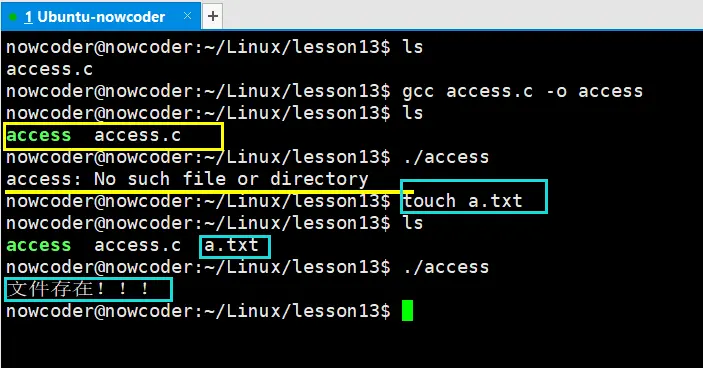
# 9.2 chmod 函数
- int chmod(const char *pathname, mode_t mode);
#include <sys/stat.h>
int chmod(const char *pathname, mode_t mode);
修改文件的权限
参数:
- pathname: 需要修改的文件的路径
- mode:需要修改的权限值,八进制的数
返回值:成功返回0,失败返回 -1
1
2
3
4
5
6
7
2
3
4
5
6
7
#include <sys/stat.h>
#include <stdio.h>
int main()
{
int ret = chmod("a.txt", 0775);
if (ret == -1)
{
perror("chmod");
return -1;
}
return 0;
}
1
2
3
4
5
6
7
8
9
10
11
12
2
3
4
5
6
7
8
9
10
11
12
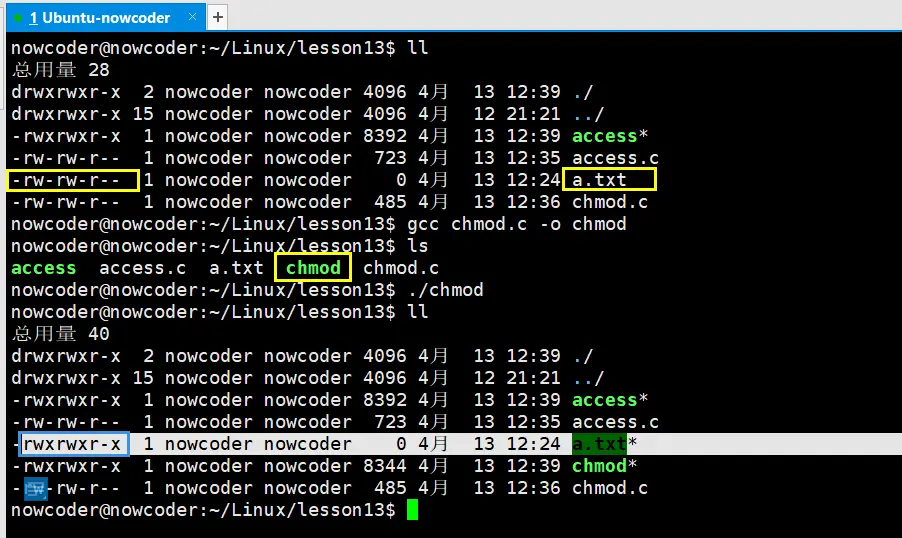
# 9.3 chown 函数
- *int chown(const char path,uid_t owner , gid_t group);
# 9.4 truncate 函数
- int truncate(const char *path, off_t length)
#include <unistd.h>
#include <sys/types.h>
int truncate(const char *path, off_t length);
作用:缩减或者扩展文件的尺寸至指定的大小
参数:
- path:需要修改的文件的路劲
- length:需要最终文件变成的大小
返回值:
成功返回 0,失败返回 -1
1
2
3
4
5
6
7
8
9
2
3
4
5
6
7
8
9
//truncate.c
#include <unistd.h>
#include <sys/types.h>
#include <stdio.h>
int main()
{
int ret = truncate("b.txt", 20);
if (ret == -1)
{
perror("truncate");
return -1;
}
return 0;
}
1
2
3
4
5
6
7
8
9
10
11
12
13
14
15
16
2
3
4
5
6
7
8
9
10
11
12
13
14
15
16
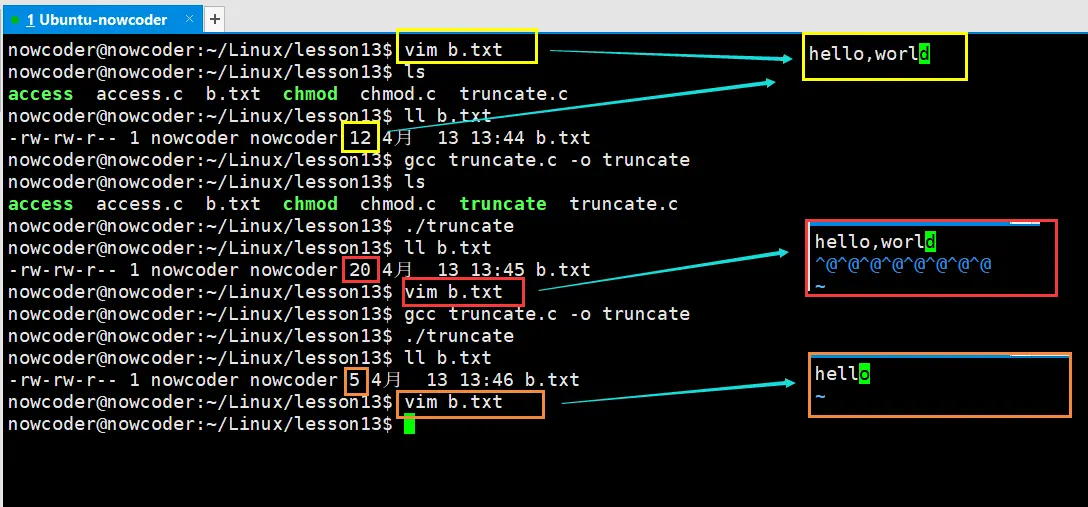
- 💛:一开始文件大小是12,因为有一个字符串结束符,所以是12个;
- ❤:把文件尺寸扩展为 20,扩充的部分(空洞)在被读取的时候是字节0;
- 🧡:把文件尺寸缩减到 5;
- 上图最后如果再执行一次
ll b.txt会发现大小又变成了6,(这应该是我们使用 vim 打开并关闭文件后,自动给添加了一个结束符 (不确定是不是)),这里发现,扩展为20,在用vim 打开文件再关闭也会有相同的情况发生,即大小变为21
# 10、目录操作函数
# 10.1 mkdir 函数
- int mkdir(const char *pathname, mode_t mode);
- 创建目录
#include <sys/stat.h>
#include <sys/types.h>
int mkdir(const char *pathname, mode_t mode);
作用:创建一个目录
参数:
pathname:创建的目录的路劲
mode:权限,八进制的数
返回值:
成功返回 0 ,失败返回 -1;
1
2
3
4
5
6
7
8
9
2
3
4
5
6
7
8
9
#include <sys/stat.h>
#include <sys/types.h>
#include <stdio.h>
int main()
{
// 注意:这里不要写成 777 ,不然是十进制数, 要写 0777才对
int ret = mkdir("aaa", 0777);
if (ret == -1)
{
perror("mkdir");
return -1;
}
return 0;
}
1
2
3
4
5
6
7
8
9
10
11
12
13
14
15
16
2
3
4
5
6
7
8
9
10
11
12
13
14
15
16
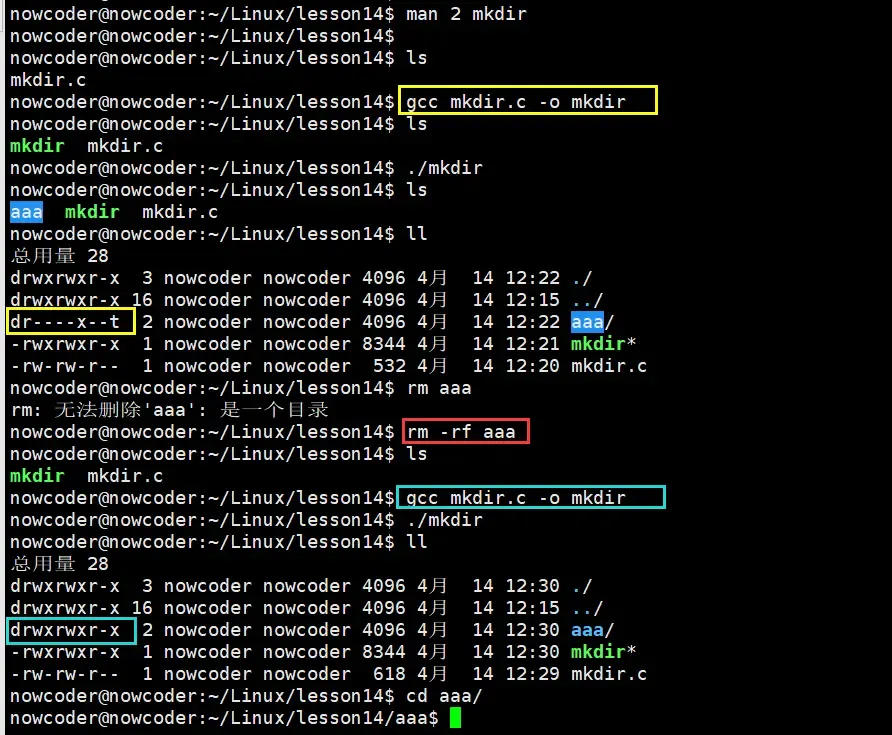
- 🟨:aaa 权限错误是因为我们把代码写成了 mkdir("aaa" , 777);
- 🟥:删除目录要加 -rf ,
rm -rf aaa; - 💦:修改了权限,把777 改成了 0777,再经过与权限掩码取反后再 &(与) 运算,就得出图上的权限
# 10.2 rmdir 函数
- int rmdir( const char * pathname);
- 删除目录,只能删除空目录,如果目录里有东西,就删不了
# 10.3 rename 函数
- int rename(const char *oldpath, const char *newpath);
- 修改文件名
#include <stdio.h>
int rename(const char *oldpath, const char *newpath);
参数:
- 旧的名称 ,新的名称
返回值 :
成功返回 0 ,失败返回 -1
1
2
3
4
5
6
2
3
4
5
6
#include <stdio.h>
int main()
{
int ret = rename("aaa", "bbb");
if (ret == -1)
{
perror("rename");
return -1;
}
return 0;
}
1
2
3
4
5
6
7
8
9
10
11
12
2
3
4
5
6
7
8
9
10
11
12
# 10.4 chdir 和 getcwd 函数
- int chdir(const char *path);
- 修改工作目录
- char *getcwd(char *buf, size_t size);
- 获取当前工作目录
#include <unistd.h>
int chdir(const char *path);
作用:修改进程的工作目录
比如在 /home/nowcoder 启动了一个可执行程序a.out,进程的工作目录 /home/nowcoder
参数:
- path:需要修改的工作目录
#include <unistd.h>
char *getcwd(char *buf, size_t size);
作用: 获取当前的工作目录
参数:
- buf:存储的路径,指向的是一个数值(传出参数)
- size:数值的大小
返回值:
返回的指向的一块内存,这个数据就是第一个参数
1
2
3
4
5
6
7
8
9
10
11
12
13
14
2
3
4
5
6
7
8
9
10
11
12
13
14
#include <unistd.h>
#include <stdio.h>
#include <sys/stat.h>
#include <sys/types.h>
#include <fcntl.h>
int main()
{
// 获取当前的工作目录
char buf[128];
getcwd(buf, sizeof(buf));
printf("当前的工作目录是:%s\n", buf);
// 修改工作目录
int ret = chdir("/home/nowcoder/Linux/lesson13");
if (ret == -1)
{
perror("chdir");
return -1;
}
// 创建一个新的文件
int fd = open("chdir.txt", O_CREAT | O_RDWR, 0664);
if (fd == -1)
{
perror("open");
return -1;
}
//关闭文件
close(fd);
// 获取当前的工作目录
char buf1[128];
getcwd(buf1, sizeof(buf1));
printf("当前的工作目录是:%s\n", buf1);
return 0;
}
1
2
3
4
5
6
7
8
9
10
11
12
13
14
15
16
17
18
19
20
21
22
23
24
25
26
27
28
29
30
31
32
33
34
35
36
37
38
39
40
41
2
3
4
5
6
7
8
9
10
11
12
13
14
15
16
17
18
19
20
21
22
23
24
25
26
27
28
29
30
31
32
33
34
35
36
37
38
39
40
41
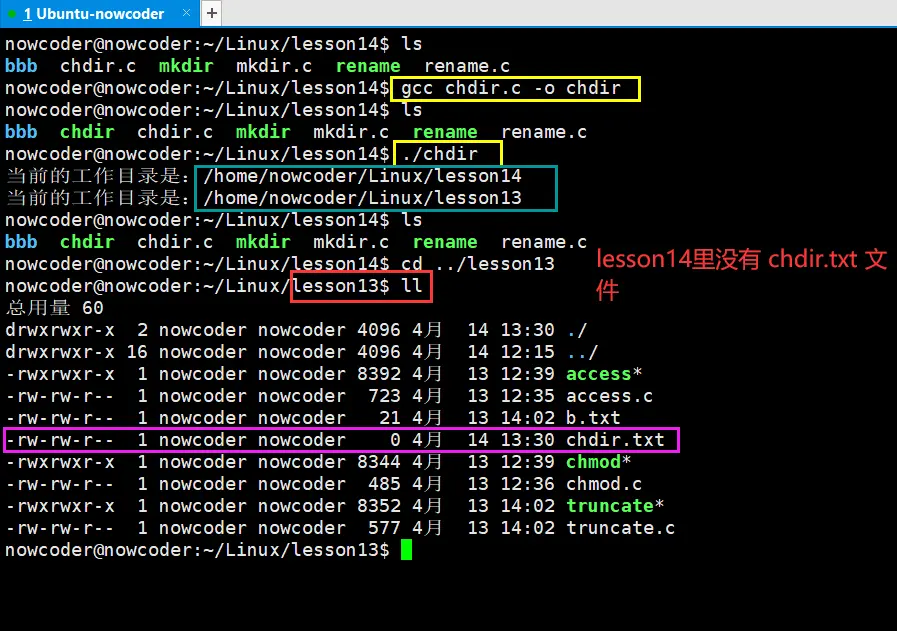
# 11、目录遍历函数
DIR *opendir(const char *name);
//打开一个目录 #include <sys/types.h> #include <dirent.h> DIR *opendir(const char *name); 参数: -name:需要打开的目录的名称 返回值: DIR *类型,理解为目录流 错误返回 NULL1
2
3
4
5
6
7
8
9struct dirent *readdir(DIR *dirp);
//读取目录中的数据 #include <dirent.h> struct dirent *readdir(DIR *dirp); - 参数: dirp 是opendir返回的结果 -返回值: struct dirent //代表读取到的文件的信息 //读取到了末尾或者失败了,返回NULL1
2
3
4
5
6
7
# 11.1 dirent 结构体和 d_type
struct dirent
{
// 此目录进入点的inode,节点 整数 表示文件在虚拟文件系统中的位置
ino_t d_ino;
// 目录文件开头至此目录进入点的位移, 偏移量 目录中的位置
off_t d_off;
// d_name 的长度, 不包含NULL字符,文件名实际的大小
unsigned short int d_reclen;
// d_name 所指的文件类型
unsigned char d_type;
// 文件名 ,用来存储文件名
char d_name[256];
};
d_type:
DT_BLK - 块设备
DT_CHR - 字符设备
DT_DIR - 目录
DT_LNK - 软连接
DT_FIFO - 管道
DT_REG - 普通文件
DT_SOCK - 套接字
DT_UNKNOWN - 未知
1
2
3
4
5
6
7
8
9
10
11
12
13
14
15
16
17
18
19
20
21
22
23
24
2
3
4
5
6
7
8
9
10
11
12
13
14
15
16
17
18
19
20
21
22
23
24
int closedir(DIR *dirp);
//关闭目录 #include <sys/types.h> #include <dirent.h> int closedir(DIR *dirp); - 参数: dirp 是opendir返回的结果1
2
3
4
5
# 11.2 获取指定目录下普通文件的数量
//readFileNum.c
#include <sys/types.h>
#include <dirent.h>
#include <stdio.h>
#include <string.h> //strcmp(),sprintf()
#include <stdlib.h> //exit()
int getFileNum(const char *path);//声明函数
// 读取某个目录下所有的普通文件的个数
int main(int argc, char *argv[])
{
if (argc < 2)
{
printf("%s path\n", argv[0]);
return -1;
}
int num = getFileNum(argv[1]);
printf("普通文件的个数为:%d\n", num);
return 0;
}
// 用于获取目录下所有普通文件的个数
// 我们传入进去的这个参数不需要被修改,所以加个 const
int getFileNum(const char *path)
{
// 1.打开目录
DIR *dir = opendir(path);
if (dir == NULL)
{
perror("opendir");
exit(0);
}
struct dirent *ptr;
// 记录普通文件的个数
int total = 0;
while ((ptr = readdir(dir)) != NULL)
{
// 获取名称
char *dname = ptr->d_name;
// 忽略掉 . 和 ..
// strcmp() 比较字符串,如果相等返回0
if (strcmp(dname, ".") == 0 || strcmp(dname, "..") == 0)
{
continue;
}
// 判断是否是普通文件还是目录
// 这里 DT_DIR 在vscode里写时会显示未定义,应该是版本问题,我们gcc编译是能正常的
if (ptr->d_type == DT_DIR)
{
// 目录,需要继续读取读取整个目录
char newpath[256];
sprintf(newpath, "%s/%s", path, dname);
total += getFileNum(newpath);
}
if (ptr->d_type == DT_REG)
{
// 普通文件
total++;
}
}
// 关闭目录
closedir(dir);
return total;
}
1
2
3
4
5
6
7
8
9
10
11
12
13
14
15
16
17
18
19
20
21
22
23
24
25
26
27
28
29
30
31
32
33
34
35
36
37
38
39
40
41
42
43
44
45
46
47
48
49
50
51
52
53
54
55
56
57
58
59
60
61
62
63
64
65
66
67
68
69
70
71
72
73
74
2
3
4
5
6
7
8
9
10
11
12
13
14
15
16
17
18
19
20
21
22
23
24
25
26
27
28
29
30
31
32
33
34
35
36
37
38
39
40
41
42
43
44
45
46
47
48
49
50
51
52
53
54
55
56
57
58
59
60
61
62
63
64
65
66
67
68
69
70
71
72
73
74
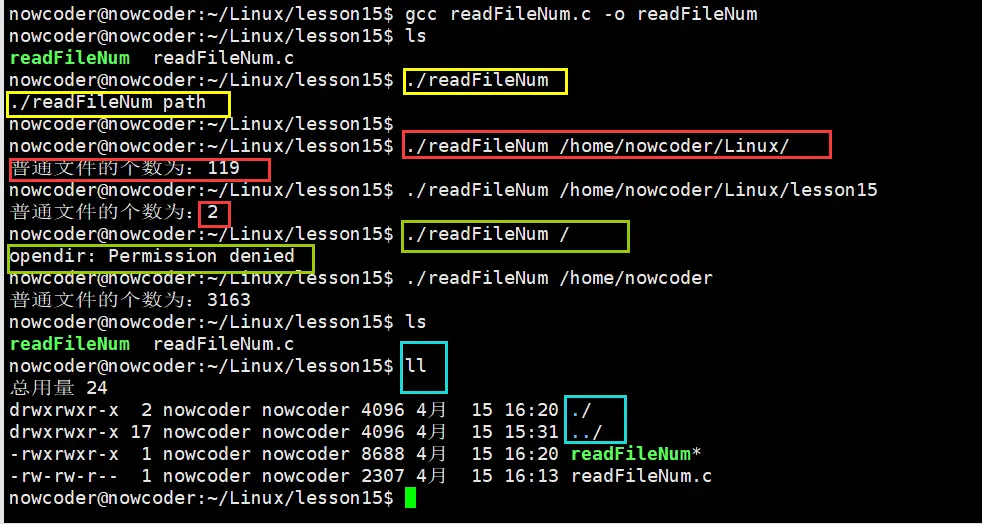
- 🟡:没有传入参数(目录路径)
- 🔴:正常运行查看
- 🟢:没有权限/拒绝访问
- 🌬:我们用
ll命令会发现,一个目录里除了本来又的文件或子目录外还有./(当前目录) ,../(上一级目录),所以我们代码里,需要除开这两个目录,注意:我们判断时直接判断.和..就行 ,而不是./和../
# 12、dup、dup2 函数
# 12.1 dup() 函数
- int dup(int oldfd);
- 复制文件描述符
#include <unistd.h> int dup(int oldfd); 作用:复制一个新的文件描述符 fd=3,int fd1 = dup(fd), fd指向的是 a.txt ,fd1也是指向 a.txt 从空闲的文件描述符表里找一个最小的,作为新的拷贝的文件描述符 参数: 返回值: int dup2(int oldfd, int newfd);1
2
3
4
5
6
7
8
9
//dup.c
#include <unistd.h>
#include <stdio.h>
#include <sys/types.h>
#include <sys/stat.h>
#include <fcntl.h>
#include <string.h>
int main()
{
int fd = open("a.txt", O_RDWR | O_CREAT, 0664);
int fd1 = dup(fd);
if (fd1 == -1)
{
perror("dup");
return -1;
}
printf("fd : %d , fd1 : %d\n", fd, fd1);
//关闭 fd
close(fd);
char *str = "hello,world";
int ret = write(fd1, str, strlen(str));
if (ret == -1)
{
perror("write");
return -1;
}
//关闭 fd1
close(fd1);
return 0;
}
1
2
3
4
5
6
7
8
9
10
11
12
13
14
15
16
17
18
19
20
21
22
23
24
25
26
27
28
29
30
31
32
33
2
3
4
5
6
7
8
9
10
11
12
13
14
15
16
17
18
19
20
21
22
23
24
25
26
27
28
29
30
31
32
33
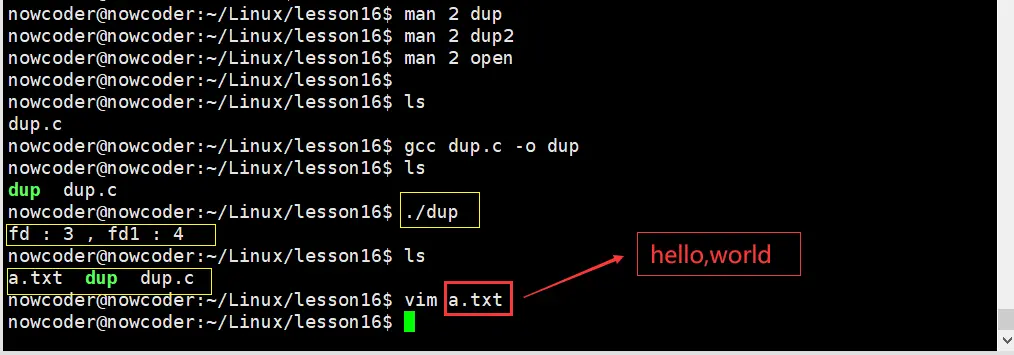
- a.txt 会被改变,相当于把 a.txt 的文件信息又复制了一份,从空闲的文件描述符表里找一个最小的,作为新的拷贝的文件描述符,存放到文件描述符表中,所以我们使用
fd1修改文件,也会修改a.txt文件
# 12.2 dup2() 函数
- int dup2(int oldfd, int newfd);
- 重定向文件描述符
#include <unistd.h> int dup2(int oldfd, int newfd); 作用:重定向文件描述符 //oldfd 指向 a.txt,newfd 指向 b.txt //调用函数成功后: newfd 和 b.txt 做 💛close💖,newfd 指向了 a.txt //(这里并不是把newfd的值改成 oldfd的值,而是说 newfd 指向的信息不再是 b.txt而是 a.txt) //oldfd 必须是一个有效的文件描述符 //如果oldfd 和 newfd值相同,相当于什么都没做 返回值:newfd1
2
3
4
5
6
7
8
9
//dup2.c
#include <unistd.h>
#include <stdio.h>
#include <sys/types.h>
#include <sys/stat.h>
#include <fcntl.h>
#include <string.h>
int main()
{
int fd1 = open("1.txt", O_RDWR | O_CREAT, 0664);
if (fd1 == -1)
{
perror("open");
return -1;
}
int fd2 = open("2.txt", O_RDWR | O_CREAT, 0664);
if (fd2 == -1)
{
perror("open");
return -1;
}
printf("fd1 : %d, fd2 : %d\n", fd1, fd2);
// 返回值是 newfd的值 ,所以 fd 和fd2 相等
int fd = dup2(fd1, fd2);
if (fd == -1)
{
perror("dup2");
return -1;
}
// 通过fd2去写数据,实际操作的是 1.txt,而不是2.txt
char *str = "hello, dup2";
int len = write(fd2, str, strlen(str));
if (len == -1)
{
perror("write");
return -1;
}
printf("fd1 : %d, fd2 : %d,fd : %d\n", fd1, fd2, fd);
// 因为fd 和 fd2是相同的,所以我们关闭一个就可以
close(fd1); // 关闭了 fd1指向的a.txt文件
close(fd2); // 同上
return 0;
}
1
2
3
4
5
6
7
8
9
10
11
12
13
14
15
16
17
18
19
20
21
22
23
24
25
26
27
28
29
30
31
32
33
34
35
36
37
38
39
40
41
42
43
44
45
46
47
48
49
50
51
52
53
2
3
4
5
6
7
8
9
10
11
12
13
14
15
16
17
18
19
20
21
22
23
24
25
26
27
28
29
30
31
32
33
34
35
36
37
38
39
40
41
42
43
44
45
46
47
48
49
50
51
52
53
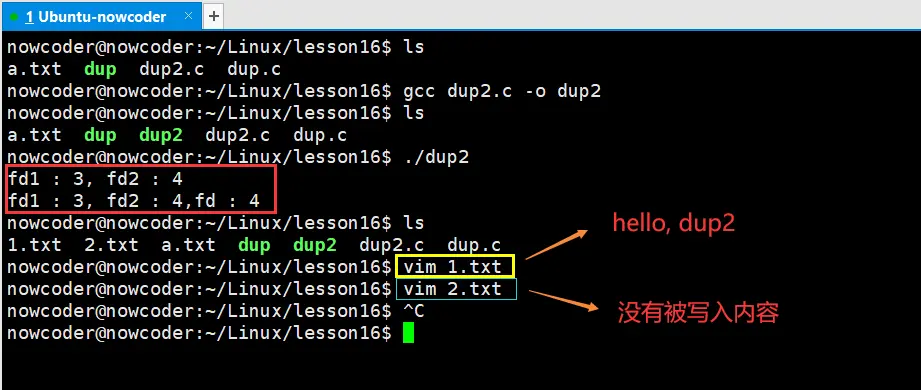
- 可以看出
dup2()的返回值是newfd - 这里
fd2对2.txt的指向被关闭,然后被指向了fd1指向的1.txt,所以数据写进了1.txt里
# 13、fcntl() 函数
- int fcntl(int fd, int cmd, ... /* arg */ );
- 复制文件描述符 设置/获取文件的状态标志
#include <unistd.h> #include <fcntl.h> int fcntl(int fd, int cmd, ... arg ); 参数: fd : 表示需要操作的文件描述符 cmd : 表示对文件描述符进行什么操作 - F_DUPFD 复制文件描述符,复制的是第一个参数 fd,得到一个新的文件描述符(返回值) int ret = fcntl(fd,F_DUPFD); - F_GETFL : 获取指定的文件描述符文件状态 flag 获取的flag和我们通过open函数传递的flag是一个东西。 -F_SETFL : 设置文件描述符文件状态 flag 必选项:O_RDONLY,O_WRONLY,O_RDWR 不可以被修改 可选项:O_APPEND, O_NONBLOCK O_APPEND 表示追加数据 O_NONBLOCK 设置成非阻塞 //阻塞和非阻塞:描述的是函数调用的行为。1
2
3
4
5
6
7
8
9
10
11
12
13
14
15
16
17
18
19
20
#include <unistd.h>
#include <fcntl.h>
#include <stdio.h>
#include <string.h>
int main()
{
// 1.复制文件描述符写法:
// int fd = open("1.txt",O_RDONLY);
// int ret = fcntl(fd,F_DUPFD);
// 2.修改或者获取文件状态的flag
// 这里我们不能用O_RDONLY,要用O_RDWR,因为我们下面设置O_APPEND 只是往后面里追加,而不是有写的权限
int fd = open("1.txt", O_RDWR);
if (fd == -1)
{
perror("open");
return -1;
}
// 获取文件描述符状态 flag
int flag = fcntl(fd, F_GETFL);
if (flag == -1)
{
perror("fcntl");
return -1;
}
//必须以这种方式去修改权限,而不能直接就设置O_APPEND,不然原先的权限就被覆盖了
flag |= O_APPEND; // flag = flag | O_APPEND;
// 修改文件描述符状态的flag,给flag加入 O_APPEND 这个标记
int ret = fcntl(fd, F_SETFL, flag); // 如果 ret =-1,就说明调用 fcntl失败
if (ret == -1)
{
perror("fcntl");
return -1;
}
char *str = "nihao";
write(fd, str, strlen(str));
close(fd);
return 0;
}
1
2
3
4
5
6
7
8
9
10
11
12
13
14
15
16
17
18
19
20
21
22
23
24
25
26
27
28
29
30
31
32
33
34
35
36
37
38
39
40
41
42
43
44
2
3
4
5
6
7
8
9
10
11
12
13
14
15
16
17
18
19
20
21
22
23
24
25
26
27
28
29
30
31
32
33
34
35
36
37
38
39
40
41
42
43
44

- 给 1.txt文件末尾追加了数据,如果我们直接用 O_WRONLY 来给文件写入数据,那就是从文件开头写入,会把文件原先的内容覆盖,所以我们要在末尾写数据,要修改文件描述符,开启O_APPEND 的权限
编辑 (opens new window)
上次更新: 2023/09/13, 12:29:52
